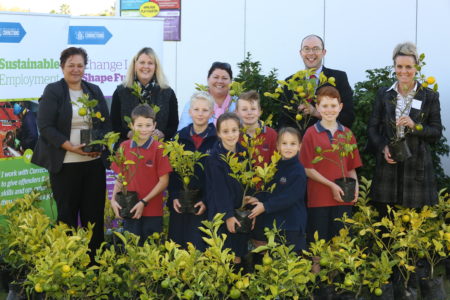
Students and teachers of Wakaaranga School are thrilled to be part of a two-fold initiative by Corrections and Auckland Council that ties in with Auckland Mayor Phil Goff’s drive of planting a million trees.
Enviroschools lead teacher Kylee Hanlon-Judd along with acting principal Caroline von Sierakowski and a handful of students received a consignment of 115 Meyer lemon trees from Lynette Cave, Operational Director Corrections Services and Marua Kutu, service manager Manurewa Community Corrections, on Tuesday morning.
Ms Hanlon says: “Wakaaranga School already has around 50 trees and it is great to be part of the sustainable employment and create a greener, healthier environment. We are excited to share the trees with a cluster of other enviroschools in the area.
“Around 3.30pm today, teachers from enviroschools will be here for beekeeping. We have two bee hives in enclosures at the back of the school and so the focus today is on beekeeping. After which, we will share the lemon trees amongst us.”
Partnering with Auckland Council, this initiative involves prisoners working in prison nurseries cultivate native trees and plant seedlings, while offenders being managed in the community will do the planting.
This is the first of the lot delivered to Wakaaranga School, says David Grear, manager Industries Auckland Prisons.
Ms Sierakowski says the partnership is worth emulating: “This is a good model for the community to come to schools.”
Corrections Northern Regional commissioner Jeanette Burns says the Million Trees initiative will give offenders the chance to give back to the community and help create a lasting legacy that will benefit the environment for generations to come.
“This project is a great fit with Corrections’ goal of reducing re-offending to make New Zealand a safer place. It gives offenders an opportunity to become engaged in purposeful work, while serving their sentence,” says Ms Burns.
“Together with Auckland Council, we will be able to create not only a greener, healthier and more beautiful environment, but offenders will have a unique chance to turn their lives around, while making a lasting contribution to society.”
Offenders will gain practical skills and formal qualifications while involved in the project, which will help them gain sustainable employment and in turn lead to safer communities.
Corrections deliver horticultural training in prisons, and prisoners can earn the National Certificate in Horticulture up to level 4.
Participants in the horticultural programme undertake NZQA-accredited training in a range of areas, including propagation of plants, workplace safety, composting and planting.
At Auckland Prison nursery, for example, around 126,000 native trees and plants are being grown.
Each year, supervised offenders on community work sentences complete a total of about nearly two million hours of free labour in New Zealand communities.








